Serving 490 students in grades Prekindergarten-5, P.s. 203 Floyd Bennett School ranks in the bottom 50% of all schools in New York for overall test scores (math proficiency is bottom 50%, and reading proficiency is bottom 50%).
The percentage of students achieving proficiency in math is 45% (which is lower than the New York state average of 46%). The percentage of students achieving proficiency in reading/language arts is 36% (which is lower than the New York state average of 49%).
The student:teacher ratio of 14:1 is higher than the New York state level of 11:1.
Minority enrollment is 92% of the student body (majority Black), which is higher than the New York state average of 60% (majority Hispanic and Black).
Quick Stats (2025)
- Grades: Prekindergarten-5
- Enrollment: 490 students
- Student:Teacher Ratio: 14:1
- Minority Enrollment: 92%
- Overall Testing Rank: Bottom 50% in NY
- Math Proficiency: 45% (Btm 50%)
- Reading Proficiency: 36% (Btm 50%)
- Science Proficiency: 65-69% (Btm 50%)
- Source: National Center for Education Statistics (NCES), NY Dept. of Education
School Overview
P.s. 203 Floyd Bennett School's student population of 490 students has declined by 27% over five school years.
The teacher population of 35 teachers has declined by 28% over five school years.
Grades Offered
Grades Prekindergarten-5
(offers virtual instruction)
(offers virtual instruction)
Total Students
490 students
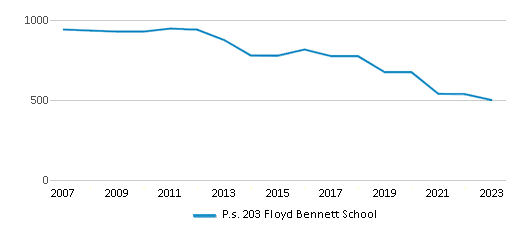
Gender %
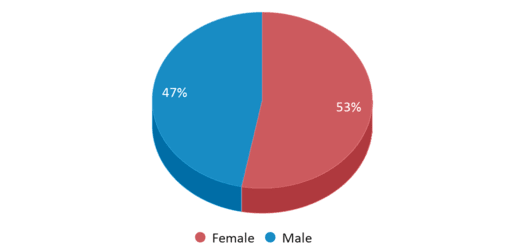
Total Classroom Teachers
35 teachers
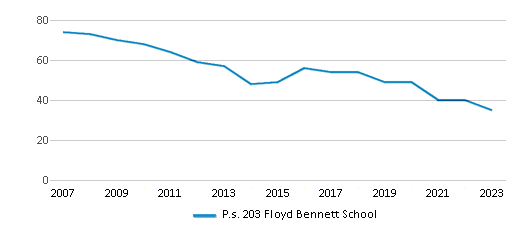
Students by Grade
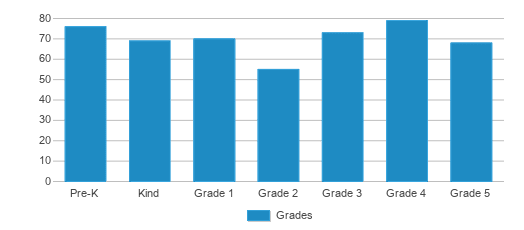
School Rankings
P.s. 203 Floyd Bennett School ranks within the bottom 50% of all 4,377 schools in New York (based off of combined math and reading proficiency testing data).
The diversity score of P.s. 203 Floyd Bennett School is 0.55, which is less than the diversity score at state average of 0.72. The school's diversity has stayed relatively flat over five school years.
Overall Testing Rank
#2738 out of 4377 schools
(Bottom 50%)
(Bottom 50%)
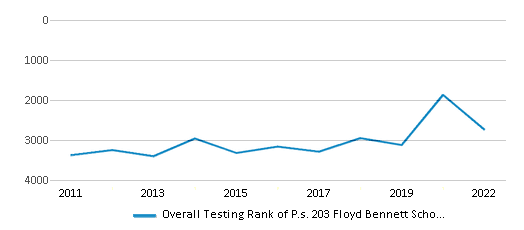
Math Test Scores (% Proficient)
45%
46%
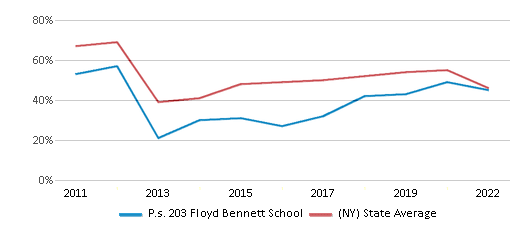
Reading/Language Arts Test Scores (% Proficient)
36%
49%
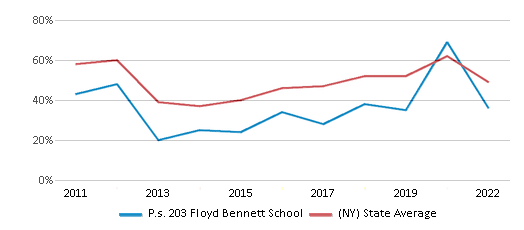
Science Test Scores (% Proficient)
65-69%
78%
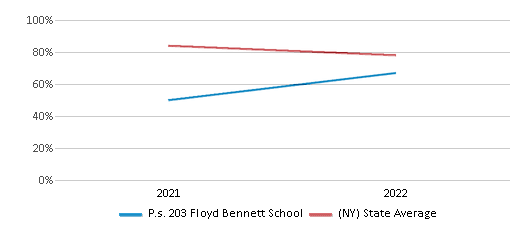
Student : Teacher Ratio
14:1
11:1
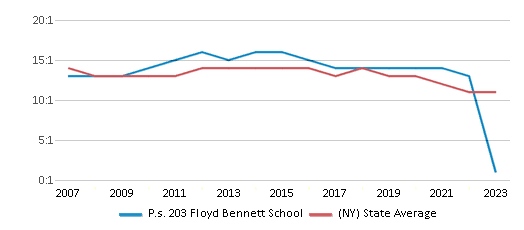
American Indian
2%
1%
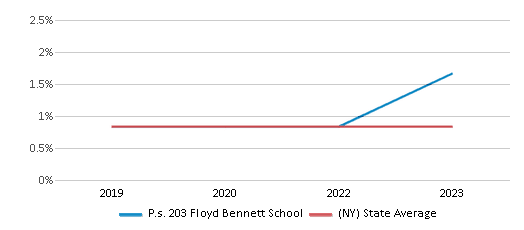
Asian
10%
10%
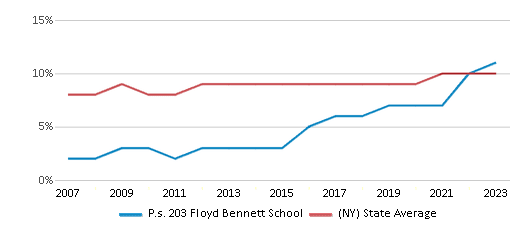
Hispanic
11%
30%
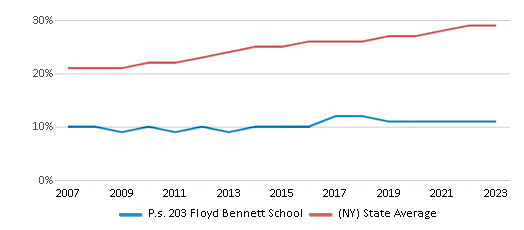
Black
65%
16%
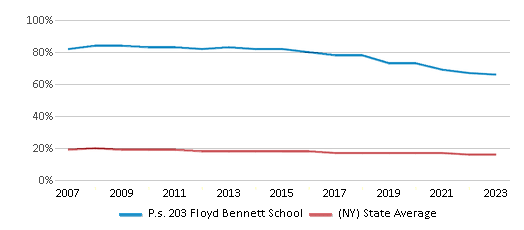
White
8%
40%
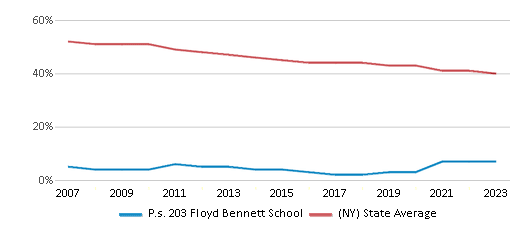
Hawaiian
2%
n/a
Two or more races
2%
3%
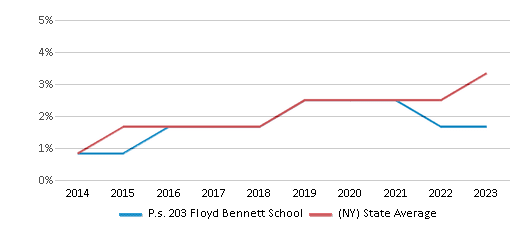
All Ethnic Groups
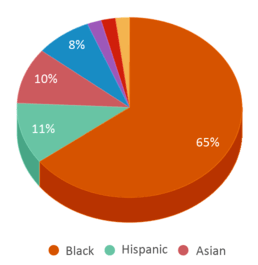
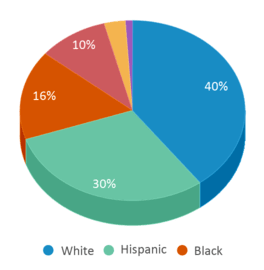
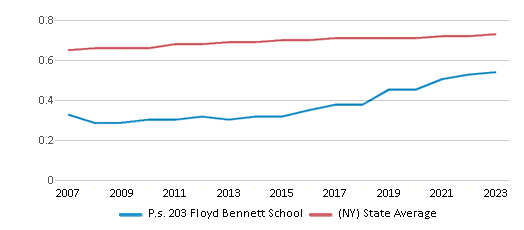
Participates in the National School Lunch Program (NSLP)
Yes
Eligible for Free Lunch
78%
54%
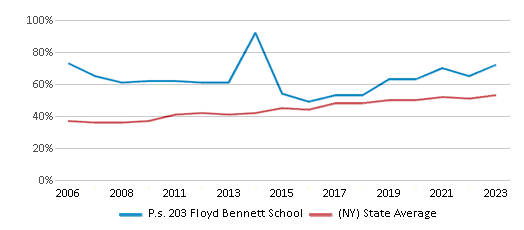
Eligible for Reduced Lunch
1%
3%
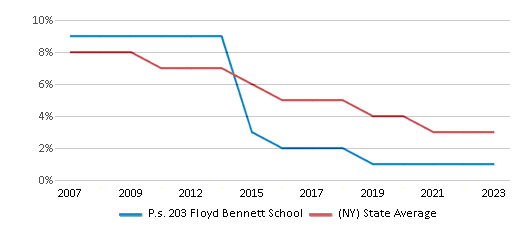
School Statewide Testing
School District Name
Source: National Center for Education Statistics (NCES), NY Dept. of Education
Profile last updated: 02/09/2025
Frequently Asked Questions
What is P.s. 203 Floyd Bennett School's ranking?
P.s. 203 Floyd Bennett School is ranked #2738 out of 4,377 schools, which ranks it among the bottom 50% of public schools in New York.
What schools are P.s. 203 Floyd Bennett School often compared to?
P.s. 203 Floyd Bennett Schoolis often viewed alongside schools like P.s. 326, P.s. 236 Mill Basin by visitors of our site.
What percent of students have achieved state testing proficiency in math and reading?
45% of students have achieved math proficiency (compared to the 46% NY state average), while 36% of students have achieved reading proficiency (compared to the 49% NY state average).
How many students attend P.s. 203 Floyd Bennett School?
490 students attend P.s. 203 Floyd Bennett School.
What is the racial composition of the student body?
65% of P.s. 203 Floyd Bennett School students are Black, 11% of students are Hispanic, 10% of students are Asian, 8% of students are White, 2% of students are American Indian, 2% of students are Hawaiian, and 2% of students are Two or more races.
What is the student:teacher ratio of P.s. 203 Floyd Bennett School?
P.s. 203 Floyd Bennett School has a student ration of 14:1, which is higher than the New York state average of 11:1.
What grades does P.s. 203 Floyd Bennett School offer ?
P.s. 203 Floyd Bennett School offers enrollment in grades Prekindergarten-5 (offers virtual instruction).
What school district is P.s. 203 Floyd Bennett School part of?
P.s. 203 Floyd Bennett School is part of New York City Geographic District #22 School District.
In what neighborhood is P.s. 203 Floyd Bennett School located?
P.s. 203 Floyd Bennett School is located in the Flatlands neighborhood of Brooklyn, NY. There are 3 other public schools located in Flatlands.
School Reviews
5 8/18/2015
When I first came to this school In the 2nd grade I knew no one ,and when your a young 7 year old girl that's pretty scary but as I kept going day by day I felt better and the amazingly kind teachers really were a big part in that and over this 4yr period at 203 I gained Many friends as I also gained a lot of knowledge and as I kept my grades up and teachers helped me in the end I graduated as class of 2012 ,and went into 6th grade with all honor classes ,and at this time I'm going to high school and I believe that ps203 really helped me with the base of education and I thank them for that .
So,I would highly recommend this school they are nurturing with the special needs kids,help misbehaving kids,and actually care about you.
Review P.s. 203 Floyd Bennett School. Reviews should be a few sentences in length. Please include any comments on:
- Quality of academic programs, teachers, and facilities
- Availability of music, art, sports and other extracurricular activities
Recent Articles

What Is A Charter School?
Explore the world of charter schools in this comprehensive guide. Learn about their history, how they operate, and the pros and cons of this educational innovation. Discover key facts about charter schools, including admission policies, demographics, and funding, as well as what to look for when considering a charter school for your child.

10 Reasons Why High School Sports Benefit Students
Discover the 10 compelling reasons why high school sports are beneficial for students. This comprehensive article explores how athletics enhance academic performance, foster personal growth, and develop crucial life skills. From improved fitness and time management to leadership development and community representation, learn why participating in high school sports can be a game-changer for students' overall success and well-being.

February 05, 2025
Understanding the U.S. Department of Education: Structure, Impact, and EvolutionWe explore how the Department of Education shapes American education, from its cabinet-level leadership to its impact on millions of students, written for general audiences seeking clarity on this vital institution.





